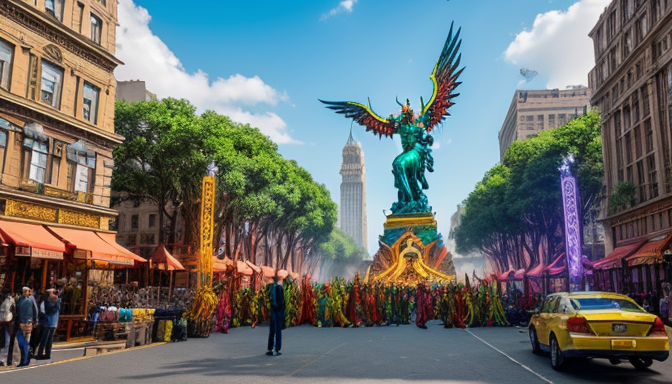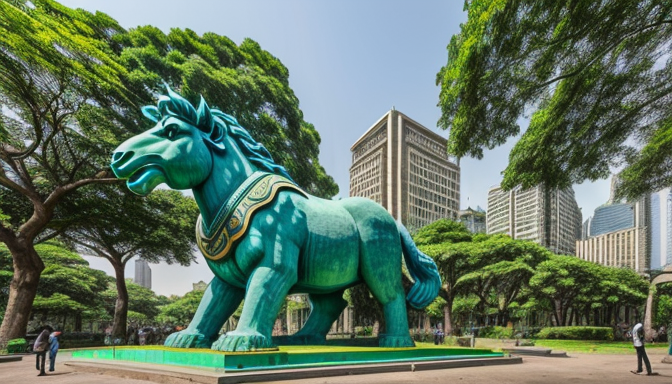Have you ever wondered how the tales of ancient gods and heroes still echo in our lives today? Mythology isn’t just a collection of old stories; it’s a powerful lens through which we can understand our modern world. From the epic tales of Greek gods to the intricate narratives of Norse legends, these myths create a rich tapestry that influences our culture, language, and belief systems. They serve as a bridge connecting our past to our present, reminding us of the universal themes of love, betrayal, and courage.
Take a moment to think about your favorite books or movies. Chances are, they borrow elements from ancient myths. For instance, the hero’s journey—a concept popularized by Joseph Campbell—echoes the adventures of figures like Odysseus or Thor. These stories have been reinterpreted countless times, yet they maintain a core that resonates with audiences across generations. Just as a timeless melody can evoke powerful emotions, these mythological narratives immerse us in a world where anything is possible.
Furthermore, the pantheons of gods and goddesses—each representing different aspects of life—offer us a framework to explore our own identities and values. In fictional worlds, these ancient archetypes are often reimagined, allowing us to engage with complex themes in a relatable way. Whether it’s a superhero battling inner demons or a fantasy character embarking on a quest for redemption, the influence of mythology is undeniable. It’s as if these ancient stories are the roots of a tree, nourishing the branches of our modern storytelling.
Mythology in Literature and Art
Mythology has always been a treasure trove for writers and artists, serving as a rich source of inspiration that transcends time and culture. Think about it: ancient myths are like the blueprints of storytelling, providing foundational themes that resonate with the human experience. From the epic tales of gods and heroes in ancient Greece to the intricate narratives found in Norse mythology, these stories are not just relics of the past; they are alive and kicking in our modern literature and art.
For instance, consider how the pantheon of Greek gods has influenced countless novels and paintings. Authors like Rick Riordan have brilliantly woven these ancient characters into contemporary settings, making them relatable to today’s youth. This connection creates a deeper narrative immersion that allows readers to explore their own identities through the lens of myth. Similarly, artists such as Gustav Klimt have drawn on mythological themes, infusing their works with rich symbolism that invites viewers to ponder the universal truths found in these age-old tales.
Moreover, the origin stories found in various cultures often serve as a mirror reflecting societal values and human emotions. They tackle themes of love, betrayal, and heroism—elements that are as relevant today as they were thousands of years ago. Whether it’s through a gripping novel or a stunning piece of art, mythology continues to shape our understanding of the world, reminding us of our shared humanity.

Myths in Modern Media
Have you ever noticed how ancient myths and legends seep into our favorite movies, TV shows, and video games? It’s like a treasure chest of stories that keep getting reimagined! From the epic battles of gods in Greek mythology to the mystical creatures of Norse legends, these narratives provide a rich tapestry that modern creators love to weave into their works. Think about it: when you watch a superhero movie, aren’t you often reminded of the ancient heroes who faced impossible odds? Just like Hercules or Thor, today’s protagonists grapple with their destinies, embodying the timeless struggle between good and evil.
Take a moment to consider how these ancient tales are reinterpreted for contemporary audiences. For example, in popular series like Game of Thrones, you can see echoes of the Greek pantheon in the complex relationships and moral dilemmas faced by characters. The intricate plots often reflect the flaws and virtues found in mythological figures, making them relatable to us today. Similarly, video games like God of War immerse players in a world where they can interact with these legendary figures, allowing for a deeper narrative immersion that connects players with the past.
Ultimately, the allure of mythology in modern media lies in its ability to resonate with our deepest fears, desires, and aspirations. These stories remind us of our shared humanity and the universal themes that transcend time and culture. So the next time you dive into a fictional world, take a moment to appreciate the ancient roots that enrich your experience!
Frequently Asked Questions
- How does mythology influence modern literature?
Mythology serves as a rich source of inspiration for writers, offering timeless themes and archetypes that resonate with readers. Think of it as a treasure chest of stories; authors draw from these ancient tales to create characters and plots that reflect our own experiences and struggles.
- What role does mythology play in today’s media?
In today’s movies, TV shows, and video games, mythology is everywhere! It’s like the secret sauce that makes stories more engaging. Filmmakers and game developers reinterpret these ancient narratives, giving them a modern twist that captivates audiences while keeping the essence of the original tales.
- Can you give examples of mythology in popular culture?
Absolutely! Think of movies like “Thor” or shows like “Game of Thrones,” which are steeped in mythological elements. These stories often borrow from ancient myths, showcasing gods, heroes, and epic quests that keep us on the edge of our seats.
- Why should we care about mythology today?
Mythology helps us understand our cultural roots and shared human experiences. It’s like a mirror reflecting our values, fears, and aspirations. By studying these myths, we gain insight into who we are and where we come from, making them relevant even today.

Recent Comments